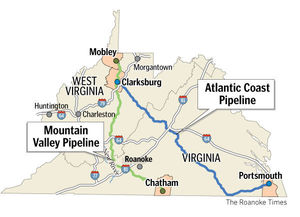Challenges opposing Mountain Valley Pipeline mounting
From an Article by Peggy Mackenzie, Mountain Messenger, November 6, 2015
On October 23rd, Mountain Valley Pipeline LLC (MVP) filed its permit application with the Federal Energy Regulatory Commission (FERC) for authorization to build a massive 301-mile interstate natural gas transmission pipeline from the fracking fields of West Virginia over the mountains and into Virginia.
An article in the State Journal offered a battery of positive benefits the pipeline would provide the state, including an estimated $811 million that would be spent in West Virginia on labor, equipment, materials and services.
An example from that article is a quote from Steve Roberts, president of the West Virginia Chamber of Commerce, in which he states, “Over the long-term, the Mountain Valley Pipeline project will not only generate significant tax revenues for counties to fund local schools, roads and other important priorities of county government; but it will also serve as a magnet for manufacturers and other economic development opportunities for our various West Virginia communities along the route.”
That quote is a stark contrast to the intense opposition voiced among local, state and regional organizations representing tens of thousands of people, including landowners whose property or communities would be affected, forest and wildlife conservationists, land preservationists, outdoor recreationists, climate activists and others.
“The MVP is not a sign of progress, but is instead a step backward,” contends the Roanoke Times in an August article.
Anti-pipeline organization groups in Virginia and West Virginia are more aggressively fighting the flawed and exaggerated information published from MVP sponsored reports about the need for the pipeline in their filings to FERC.
As previously reported in the Mountain Messenger (October 31, 2015), 30 organizations in West Virginia and Virginia filed a letter to FERC to evaluate the true need for each of the four major pipelines currently proposed for the Blue Ridge and Central Appalachian region.
In their 50-page filing, the environmental groups describe in detail how the companies presented flawed and exaggerated information about the need for the pipeline, while ignoring the impacts to the environment, landowners, communities and the general public, as well as the economic and environmental benefits of cleaner sources of energy that development of the pipeline would displace. In particular, the project would: fragment the heart of the largest remaining wild landscape in the eastern U.S.; cut through farms that have been held in families for generations, severing people’s attachment to their home places; lower property values in the vicinity of the pipeline and gas drilling areas; exacerbate health and environmental threats in communities near the fracking operations; and further commit the nation to long-term dependence on climate-altering fossil fuels.
Additionally, a new study released in early October by Key-Log Economics, sponsored by 16 citizen grassroots and community organization groups, casts strong doubts on the claims made by MVP for economic benefits of the pipeline in Virginia and West Virginia. The report shows that previous studies, sponsored by MVP, largely ignore the public and external costs attending the construction, operation and presence of the MVP.
“To date, MVP LLC offers only vague assurances that the proposed MVP would impose no, or only minor, costs on agriculture, recreation, and other economic activities. It also claims that there would be no impact on property values, and that increases in community service costs would be minor and would occur only during the construction phase.”
One such study, published by FTI Consulting, described the purported economic benefits of the MVP, but ignored costs, including loss of landscape productivity, diminished property values, diminished economic development opportunities and reduced desirability of the pipeline-affected region as a destination of choice for businesses and residents. Other impacts ignored include increased community services costs due to damage to roads and bridges and greater need for emergency services.
The Key-Log Economics report concludes that FTI study’s “nearly exclusive focus on benefits means, at a minimum, that the jury is still out on whether the MVP is good or bad, at least economically, for the citizens and communities it will affect in West Virginia and Virginia.”
See also: www.FrackCheckWV.net

